Why do dogs rub on things? Masking their scent?!
Original article by S. Veigel 06/20/2015
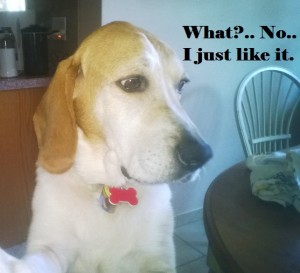 I was motivated to write this article after once again hearing an old myth that just wouldn’t go away. According to the myth dogs rub on things to “mask their scent”. Which, if you think about it, doesn’t make much sense.
I was motivated to write this article after once again hearing an old myth that just wouldn’t go away. According to the myth dogs rub on things to “mask their scent”. Which, if you think about it, doesn’t make much sense.
Human hunters can purchase Deer Scent for hunting Deer and Rabbit Scent for hunting rabbits. But I seriously doubt wolves and dogs think to themselves, “We’re going after rabbit today so we first need to get some rabbit smell on us or roll in some lettuce”. Some people point out that wolves have been observed rubbing in the blood of a fresh kill to evidence they may be trying to mask their scent. But then you see wolves all the time with no blood on them, don’t you? Probably because they do groom themselves and each other which, by the way, would just put the wolf smell back on. And even so, they would still smell like wolves with a tinge of blood and other animals probably won’t find that aroma reassuring.
When American Indians were hunting Buffalo they were said to dress in wolf skins. The reason wasn’t about the scent. It was because the Buffalo were accustomed to seeing wolves following their herds. So it didn’t matter if a Buffalo smelled a wolf. It was about seeing the wolf or something else making a threatening move.
The hunting strategy of a predator is to approach down-wind. They don’t think about how they smell, they don’t want the prey to get a whiff of anything. Then it’s a combination of slow stealthy creeps, rapid attack and/or out maneuvering their prey as a pack.
Just to drive this point home remember this. Animals (not just dogs) are well equipped to differentiate all the odors wafting their way. As you know dogs can tell the difference between all the ground odors and a rabbit or human scent. AND they can tell which track is fresh even if the ground is covered with the scent of dirt, strong smelling foliage, and the presence of animals or humans who were there before. So if a dog rubs its face in something or even rolls on the ground the basic scent is still present.
Still not convinced? I’ve rescued dogs who have been in the wild and kennels and I can tell you that an uncared for dog-like animal has a strong smell that takes several washings over time to tone down. So do this. Find a really dirty dog and just wash its face. Then you decide if a dog or a wolf rubbing on something will mask its scent.
There is no single reason for a dog to rub on things. Some actions are obvious and some suggest you need to see a groomer or a veterinarian. So whether you’ve had dogs for years or you’re a first time dog companion I’m going to assume you actually want an answer to this question. And since you need to watch for potential medical issues and dangers I’m hoping you’ll give this some attention.
I: The happy rub.
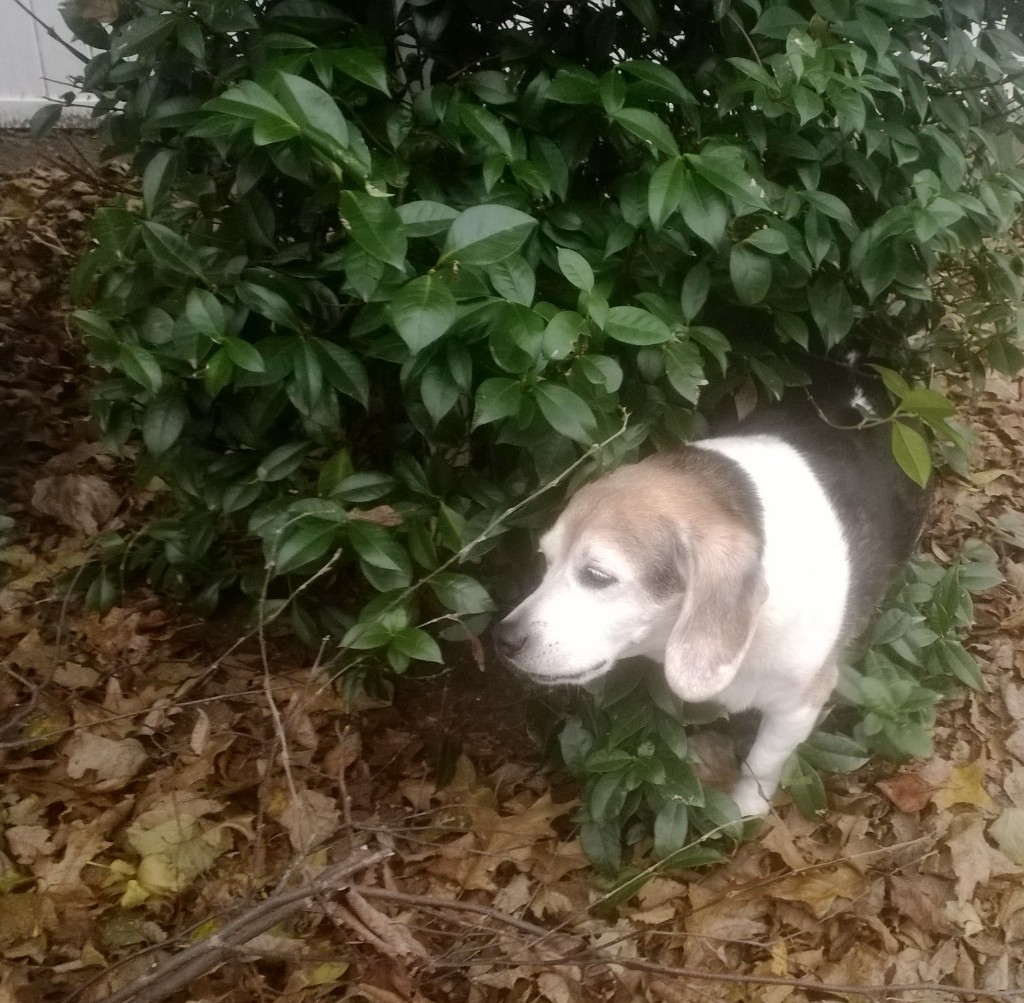 The late Casey (a Beagle Terrier mix) loved to walk round and round inside the Jasmine vine growing on the arbor in our backyard. She loved to smell it. Smoke, a medium sized dog we fostered then adopted, used to crash sideways against and rub all over the Nandina shrubs next to the patio when he first got here. When we go upstairs to bed Smoke takes great pleasure in rubbing against the bedspread sniffing and groaning for some time before he curls up on his doggie bed.
The late Casey (a Beagle Terrier mix) loved to walk round and round inside the Jasmine vine growing on the arbor in our backyard. She loved to smell it. Smoke, a medium sized dog we fostered then adopted, used to crash sideways against and rub all over the Nandina shrubs next to the patio when he first got here. When we go upstairs to bed Smoke takes great pleasure in rubbing against the bedspread sniffing and groaning for some time before he curls up on his doggie bed.
The first obvious reason for dogs rubbing is because they like affection and the scent of familiar things. They want your scent on them because it’s pleasing or familiar and they want their scent on you. It gives them a “scent” of belonging. Not unlike the giddy feeling you may have experienced while crawling into freshly washed fragrant bed sheets and feeling comfy and cozy, with a tingle of excitement about finally getting to have some sleep.
II: The “catnip effect”.
When the sperm whale regurgitates half-digested squid we get a perfume fixative called ambergris. So it shouldn’t be too difficult to imagine that dogs, with their sensitive nose, can smell other things in nature that are intoxicating but may not be our first selection for a cosmetic product. We smell catnip as a green plant but a cat will get “drunk” on its erotic fragrance.
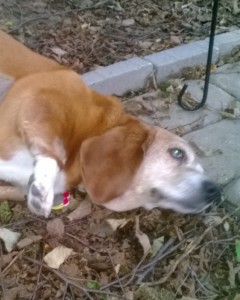 Your dog goes out and all of a sudden there’s a particular spot in the grass that makes it stop and take in a long intensive sniff. Before that time and since the dog didn’t care. But now you have a tough time pulling it away. Then it starts rubbing its face there, sniffing again and rolling around on it. Maybe you look but you don’t see anything. Sound familiar?
Your dog goes out and all of a sudden there’s a particular spot in the grass that makes it stop and take in a long intensive sniff. Before that time and since the dog didn’t care. But now you have a tough time pulling it away. Then it starts rubbing its face there, sniffing again and rolling around on it. Maybe you look but you don’t see anything. Sound familiar?
One way to figure this out is to get down and smell the ground where the dog was rubbing. Then smell the surrounding area. Fortunately I’ve done this for you.
Generally there’s an organic smell similar to poop and/or extra rich soil. There’s no poop there but another dog, your dog did its business there and nature started its cleanup process. A male dog may have marked that spot or it may be decaying leaves and fungus. The same response can be observed with some (not all) bird poop. Perhaps the bird ate something a bit more fragrant. But the point is the dog is infatuated with the aroma.
The only thing you want to watch out for, especially if you’re a first time dog walker, is that some times that “catnip effect” involves a poop in some long grass you didn’t notice. And you may end up having to give your dog a bath after it rolled in it. Usually best to pull the dog away and keep it walking if it starts this behavior.
DANGER! The catnip effect can also come from the fragrance of things like motor oil, liquids leaking from garbage containers, dead animals, dead fish, antifreeze and other chemicals you may encounter on a walk or at the beach. Some things, like antifreeze, can be absorbed through the pads on your dog’s foot and poison them if it’s wet. Be alert! Walk around! Walk them away from it!
III: Oh that smell.
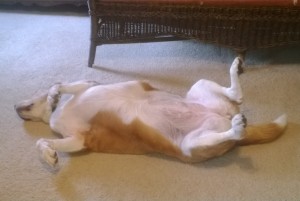 After a bath you’ll often see dogs rubbing their face and bodies on your carpet and furniture or outside in the dirt or grass. You’ll notice that it’s not a specific spot like the “catnip effect”. They’re far more random about rubbing everywhere and on anything.
After a bath you’ll often see dogs rubbing their face and bodies on your carpet and furniture or outside in the dirt or grass. You’ll notice that it’s not a specific spot like the “catnip effect”. They’re far more random about rubbing everywhere and on anything.
Several things are going on here. For one thing they’re stimulated and they do feel better. They may even like the shampoo smell a little. But they really want to tone it down and get some of the “my house” smell back. And that process usually includes allot of moaning and groaning mixed with excited barks. As if they want to tell you what they think about the experience.
IV: The facial rub that needs your attention, a groomer or veterinarian.
Your dog is rubbing its face on your carpet and appears to be rubbing more where the ears are. The dog shakes its head and may dig at the ear with its paw. If you see this assume there may be something in the ear, needs a cleaning or that it’s developing an ear infection. Shine a flashlight in the ear and see if it got a bug or foreign matter in the ear. Smell the inside of the ear to detect any unusual or strong odor. Get some cotton balls and some pet ear cleaner from your pet store to wipe out and treat the ears (follow the instruction) or contact a groomer. If the dog continues this behavior you may want to see a veterinarian. In fact, any time you’re not sure, ask your veterinarian.
V: When dragging the rear on the ground requires a veterinarian.
Generally speaking animals don’t drag their butts. If they do something is going on. I have had dogs with a similar body type (Broad and rounded in the rear) where they just seemed to have a problem scratching that itch. Casey and later Ginnie were both this body type and I often got results scratching their fur near the tail and their back legs. They loved it and seemed genuinely satisfied. But this is not the norm.
If a dog is dragging its butt note whether they had diarrhea or abnormal bowel movements that could be causing a burning itch. Poop should be moist looking but well-formed. It should not be runny, dry or hard. You also want to notice if there’s any swelling around the anus. If there is this could be a blocked and/or infected anal (“scent”) gland. And if it is not treated it can cause illness and/or permanent damage.
To keep the anal gland healthy groomers and veterinarians will squeeze (express) the area around the anus to keep it clear or to clear some of the infection. Infected anal glands are generally treated with antibiotics and/or minor surgery. Dabbing the area with a cloth soaked in Turmeric powder and water is an excellent natural painless antiseptic and anti-inflammatory to use after surgery. If you’re not sure, ask your veterinarian.
VI: The Dander things.
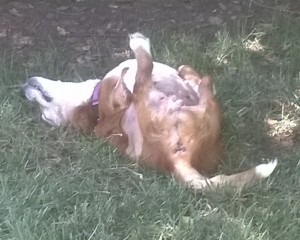 Last of all I’ll mention the fact that dogs shed their fur, especially in the summer (but you knew that). They walk through shrubbery, roll on their back and rub on things to get rid of loose dander and fur which can make them itchy. They’ll also roll in loose dirt to frustrate insects. To us their rolling around is a happy expression, and it is. It’s the happy expression of scratching that itch.
Last of all I’ll mention the fact that dogs shed their fur, especially in the summer (but you knew that). They walk through shrubbery, roll on their back and rub on things to get rid of loose dander and fur which can make them itchy. They’ll also roll in loose dirt to frustrate insects. To us their rolling around is a happy expression, and it is. It’s the happy expression of scratching that itch.
But it has nothing to do with “masking their scent”.
See also: Canadian Journal of Zoology
“Scent rubbing in wolves (Canis lupus): the effect of novelty”.
A study by: Jenny Ryon, J.C. Fentress, F.H. Harrington and Susan Bragdon
https://www.nrcresearchpress.com/doi/abs/10.1139/z86-084?journalCode=cjz#.VZ534flViko